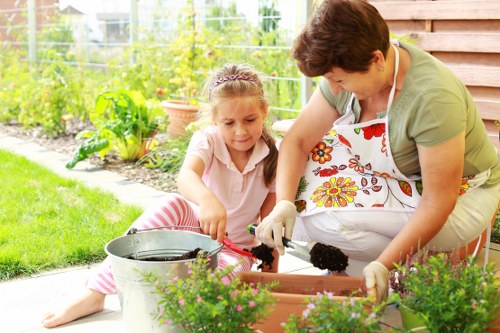Comprehensive Guide to Garden Maintenance in Edmonton

Maintaining a beautiful garden in Edmonton requires understanding the unique climate and environmental conditions of the region. Edmonton experiences a wide range of temperatures and weather patterns throughout the year, which can significantly impact your garden's health and appearance.
From the cold winters to the warm summers, each season presents its own set of challenges and opportunities for garden maintenance. By tailoring your gardening practices to Edmonton's specific conditions, you can ensure that your plants thrive all year round.
In this guide, we'll explore essential garden maintenance tips, including seasonal tasks, soil preparation, pest management, and more, to help you create and sustain a vibrant garden in Edmonton.
Understanding the Edmonton Climate for Your Garden

Edmonton's climate is characterized by cold winters and warm summers, with a relatively short growing season. The city experiences long daylight hours in the summer and short days in the winter, which can affect plant growth and blooming cycles.
The average temperature in winter can drop below -20°C (-4°F), while summer temperatures can soar above 25°C (77°F). Additionally, Edmonton receives a moderate amount of precipitation throughout the year, including snow, rain, and hail, all of which can influence garden maintenance strategies.
Understanding these climatic factors is crucial for selecting the right plants, scheduling maintenance tasks, and implementing protective measures to ensure your garden remains healthy and attractive.
Choosing the Right Plants for Edmonton Gardens

Selecting plants that are well-suited to Edmonton's climate is the foundation of effective garden maintenance. Opt for native or cold-hardy plant varieties that can withstand temperature fluctuations and seasonal changes.
Consider plants that have a shorter growing season and can complete their life cycles within the available warm months. Additionally, drought-tolerant species are beneficial due to the dry spells that can occur during the summer.
Some popular choices for Edmonton gardens include perennials like coneflowers, daylilies, and ornamental grasses, as well as shrubs such as lilacs and hydrangeas. These plants not only thrive in the local climate but also add aesthetic value to your garden.
Seasonal Garden Maintenance Tips

Each season in Edmonton brings its own set of maintenance tasks to keep your garden in optimal condition. By adhering to a seasonal maintenance schedule, you can address the specific needs of your plants and garden infrastructure throughout the year.
Below, we detail essential maintenance practices for spring, summer, autumn, and winter to help you plan and execute your garden care effectively.
Spring Maintenance
- Clean up debris left from winter, including fallen leaves and dead plants.
- Prune trees and shrubs to encourage new growth.
- Prepare soil by tilling and adding compost or fertilizers.
Summer Maintenance

Summer is a time of active growth, but it also requires diligent care to ensure plants remain healthy and vibrant. Regular watering, especially during dry spells, is essential to prevent drought stress.
Mulching around plants helps retain moisture, regulate soil temperature, and suppress weed growth. Additionally, monitor for pests and diseases, taking prompt action to manage any issues that arise.
Deadheading spent flowers can promote continuous blooming and maintain the garden's appearance. Implementing proper ventilation for indoor plants is also important if you maintain a greenhouse or indoor garden space.
Autumn Maintenance

As temperatures begin to drop, autumn is the time to prepare your garden for the upcoming winter. Mulch beds to insulate plant roots and prevent soil erosion caused by heavy rains or winds.
Planting cover crops can enrich the soil with nutrients and reduce weed growth. Additionally, harvesting the last of your summer crops ensures that plants do not become overgrown or prone to disease during the colder months.
Prune perennials and remove spent annuals to keep garden beds tidy and reduce the risk of pest infestations. Store garden tools and equipment in a dry place to prevent rust and damage from moisture exposure.
Winter Maintenance

Winter in Edmonton can be harsh, but with proper preparation, your garden can emerge strong in the spring. Protect sensitive plants by covering them with frost blankets or burlap to shield against freezing temperatures and snow accumulation.
Clear snow from garden structures to prevent damage and allow light to reach plants that can tolerate short periods of cold. It's also crucial to avoid heavy walking on frozen soil to prevent compaction and damage to plant roots.
Regularly inspect your garden for any signs of winter damage and address issues promptly to ensure a healthy start when the growing season returns.
Essential Tools for Garden Maintenance

Having the right tools makes garden maintenance more efficient and enjoyable. Invest in high-quality tools that are comfortable to use and designed for the specific tasks you perform regularly.
Some essential garden maintenance tools include:
- Pruning Shears: For trimming and shaping plants.
- Garden Fork: Ideal for turning soil and aerating garden beds.
- Hand Trowel: Useful for planting and transplanting small plants.
- Watering Can or Hose: To ensure consistent and adequate watering.
- Wheelbarrow: For transporting soil, compost, and other materials.
Regularly maintain your tools by cleaning and sharpening them after use to extend their lifespan and ensure optimal performance during garden maintenance tasks.
Soil Preparation and Fertilization

Soil health is fundamental to successful garden maintenance. Proper soil preparation involves assessing soil quality, adjusting pH levels, and enriching the soil with organic matter.
Test your soil to determine its nutrient content and pH level. Depending on the results, you may need to add lime to raise pH or sulfur to lower it, ensuring the soil environment is conducive to plant growth.
Incorporate compost or well-rotted manure into the soil to improve its structure, enhance fertility, and promote beneficial microbial activity. Regular fertilization with appropriate fertilizers supports plant growth and productivity throughout the growing season.
Pest and Disease Management

Effective pest and disease management is essential for maintaining a healthy garden. Regularly inspect plants for signs of pests such as aphids, beetles, and caterpillars, as well as diseases like powdery mildew and root rot.
Implement integrated pest management (IPM) practices, which combine biological, cultural, and chemical controls to minimize pest populations while reducing environmental impact.
Encourage beneficial insects like ladybugs and predatory mites that naturally control pest populations. Remove and dispose of infected plant material promptly to prevent the spread of diseases.
Watering Strategies for Edmonton Gardens

Proper watering is crucial for garden maintenance, especially in Edmonton's variable climate. Understanding the specific water needs of your plants helps prevent overwatering and underwatering, both of which can be detrimental.
Implementing efficient watering strategies, such as drip irrigation or soaker hoses, ensures that water is delivered directly to the plant roots, reducing evaporation and water waste.
Water your garden early in the morning to minimize evaporation and allow plants to absorb moisture before the heat of the day. Adjust your watering schedule based on seasonal changes and rainfall patterns to maintain optimal soil moisture levels.
Pruning and Trimming Techniques

Regular pruning and trimming are essential aspects of garden maintenance. These practices encourage healthy plant growth, improve air circulation, and enhance the overall appearance of your garden.
Use clean, sharp tools to make precise cuts, removing dead or diseased branches first. For fruit-bearing plants, pruning helps increase yield and prevent overcrowding, which can lead to pest and disease issues.
Pruning should be done at the appropriate time for each plant species, typically during the dormant season or after flowering, to minimize stress and promote robust growth.
Lawn Care in Edmonton

A well-maintained lawn is a cornerstone of garden maintenance. In Edmonton, lawn care involves regular mowing, watering, fertilizing, and aerating to keep the grass healthy and lush.
Mow your lawn regularly, maintaining the grass at an optimal height to promote strong root growth and prevent weeds from taking hold. Water deeply and infrequently to encourage deep rooting, which enhances drought resistance.
Apply a balanced fertilizer in the spring and fall to provide essential nutrients, and aerate the soil annually to alleviate compaction and improve nutrient and water uptake.
Mulching and Weed Control

Mulching is a beneficial practice in garden maintenance that helps conserve soil moisture, suppress weeds, and regulate soil temperature. Organic mulches, such as wood chips or straw, also add nutrients to the soil as they decompose.
Apply a layer of mulch around plants, ensuring it is not piled against stems or trunks to prevent rot and disease. Regularly replenish mulch to maintain its effectiveness throughout the year.
Weed control is essential to prevent competition for resources, which can hinder plant growth. Use manual weeding, mulching, or appropriate herbicides to manage weed populations effectively.
Sustainable Gardening Practices

Incorporating sustainable practices into your garden maintenance not only benefits the environment but also promotes long-term garden health. Sustainable gardening involves using resources efficiently, reducing waste, and enhancing biodiversity.
Implementing composting reduces organic waste and provides a valuable resource for soil enrichment. Planting a variety of species supports a diverse ecosystem, attracting beneficial insects and pollinators that contribute to plant health.
Consider using organic fertilizers and natural pest control methods to minimize the use of synthetic chemicals, ensuring a safer and more eco-friendly garden.
Conclusion and Call to Action

Effective garden maintenance in Edmonton requires a combination of proper planning, the right tools, and an understanding of the local climate. By following the seasonal tips and sustainable practices outlined in this guide, you can achieve a thriving and beautiful garden year-round.
Whether you're a seasoned gardener or just starting, investing time and effort into garden maintenance will reward you with a lush, vibrant outdoor space to enjoy.
Contact us today to learn more about our expert garden maintenance services in Edmonton and let us help you create the garden of your dreams!